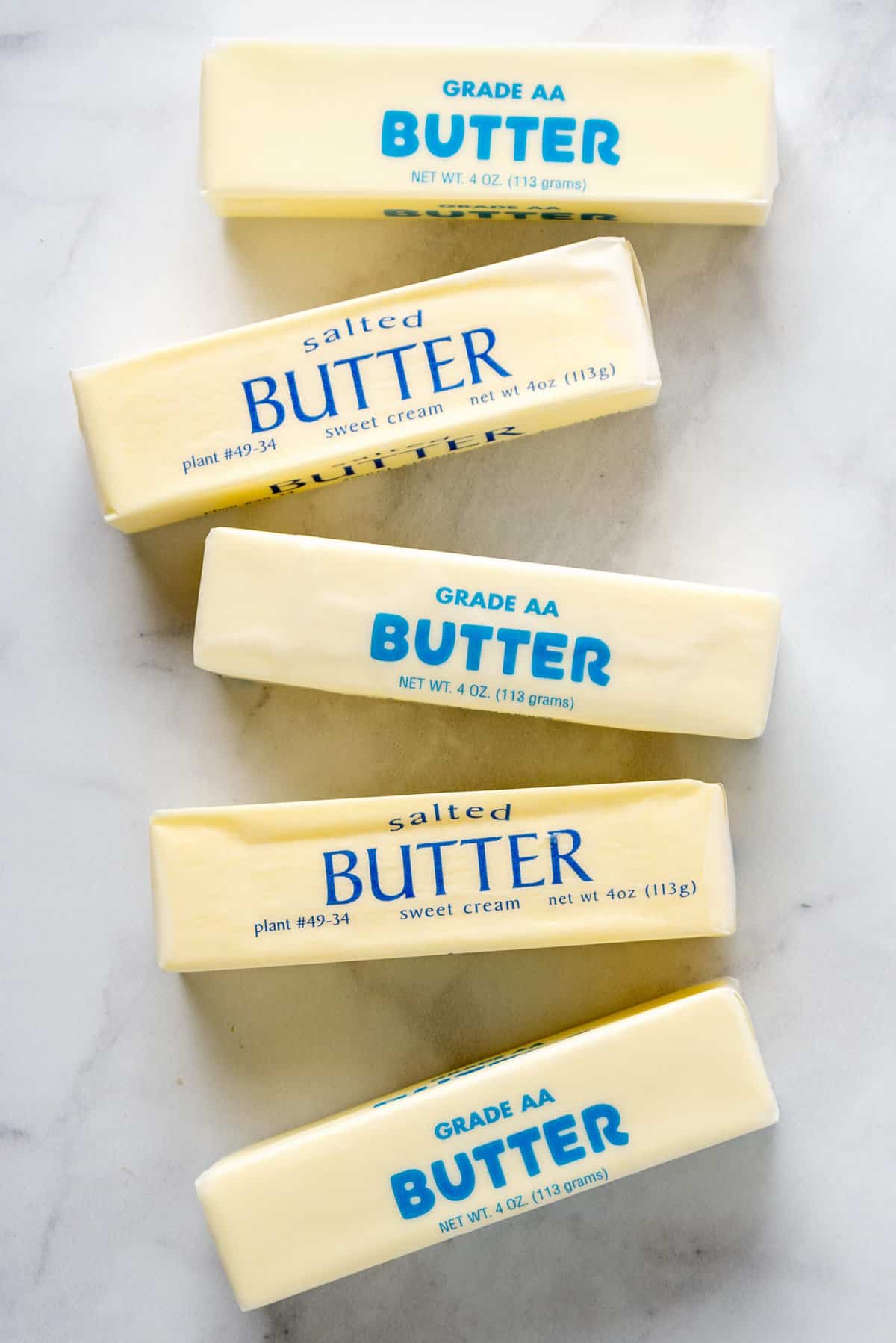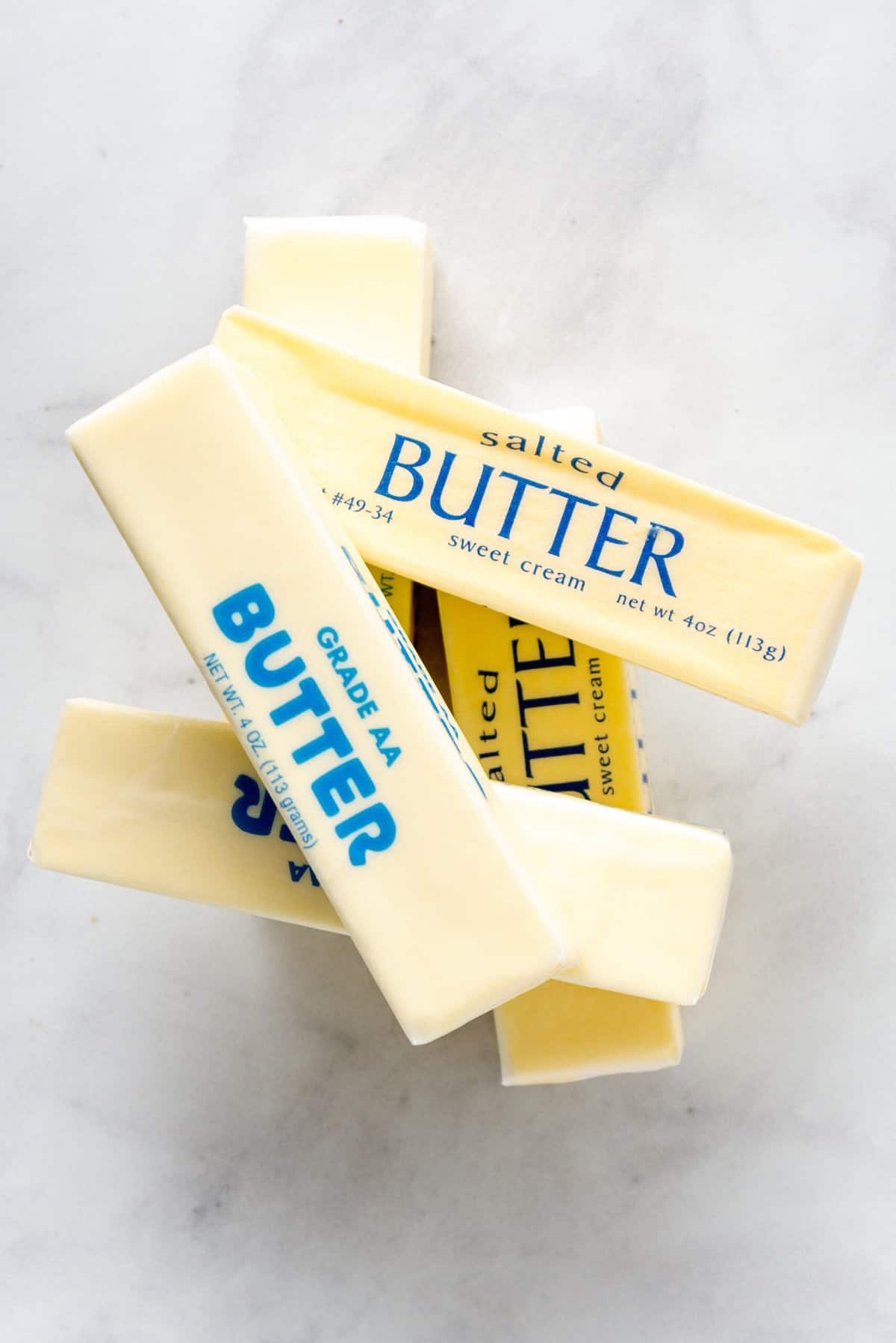I have often wondered what happens if you use salted butter instead of unsalted butter. Will my recipe totally fail? Does using salted butter really make that big of a difference when it comes to baking and cooking? And how much salt is really in salted butter? I wanted to find out.

Pin this recipe now to save it for later
Pin RecipeIf you are like me, you have wondered these things, too. It is time for us to stop questioning our butter choice and really learn about salted vs unsalted butter. Let me tell you all about the two different kinds of butter, when to use salted butter, and when unsalted butter really is the best choice.
Unsalted vs Salted Butter: What is the Difference?
The only difference between salted butter and unsalted butter is the salt. Both kinds of butter are made exactly the same, with cream as the main ingredient. Salted butter has a small amount of salt added to the cream, enhancing the butter’s flavor and the foods it accompanies.
Salt was originally added to butter as a preservative. Butter with salt will last longer in the fridge, staying fresh for about five months. Unsalted butter only keeps for about three months since it is made purely with cream. This is great if you plan to store your butter for a long time.
How Much Salt is in Salted Butter?
The amount of salt in salted butter will vary from brand to brand. However, the National Dairy Council says that salted butter should contain between 1.6% and 1.7% salt. This equals about 7 grams of salt per teaspoon of butter. It may not sound like a lot, but that tiny amount of salt has a huge impact on the flavor of the butter.

When Should I Use Unsalted Butter?
Unsalted butter is really good for everything. It is the universal butter. Unsalted butter is good for cooking or baking. You can always add salt to recipes later on if needed!
Unsalted butter is the go-to type of butter for baking. The neutral, creamy taste is perfect in baked goods where you typically want to focus on sweetness, rather than a salty flavor.
Baking is very technical and precise. Small adjustments to a recipe can make a huge difference in how a baked good turns out. With baking, you can’t taste a dish until after it is fully baked, at which time it is almost impossible to make any alterations.
Since the salt quantity in brands of butter varies, you never know how much salt is really in salted butter. Using unsalted butter ensures that a baked good doesn’t become too salty by accident. Baking recipes are specially formulated, using unsalted butter and then adding the exact amount of salt needed. Measuring the salt will help your baking taste delicious and perfect every single time.
So, when making a Kentucky butter cake or some gooey butter cookies, opt for unsalted butter to get the best results.
Unsalted Butter Tip
When you see both salt AND butter in a baking recipe, it is safe to assume that you should use unsalted butter. The correct amount of salt is being added in and any extra might be too much.
When Should I Use Salted Butter?
Salted butter is typically used in cooking savory dishes. Most savory meals will taste even better with a little extra salt. When cooking on the stovetop, it is usually safe to taste foods and then add in extra salt if needed at the end of the recipe.
Salted butter is great for sauteeing veggies, tossing with pasta, making sauces, or topping your freshly baked biscuits. Anytime butter is to be used as a spread, it should be salted butter. The taste of my homemade garlic butter is perfect when you use salted butter.
Salted Butter Tip
If you see a recipe that says to “taste then adjust the seasonings”, you should definitely use salted butter. You can always add more salt, if needed.
What Happens If You Use Salted Butter Rather Than Unsalted?
If you use salted butter in place of unsalted butter, you will notice that your baked goods or foods taste saltier. They may be overly salty, depending on the brand of butter you use. It may even be strong enough to ruin your food.
Can I Use Salted Butter Instead of Unsalted Butter in Baking?
If you only have salted butter on hand and have your heart set on baking some perfect chocolate chip cookies, you can go ahead with your baking project. When using salted butter in baking, I like to reduce the amount of salt I add to the recipe.
For example, if a recipe asks for ¼ tsp salt, I will use salted butter and reduce the added salt to just 1/8th of a teaspoon.
Reducing the salt is not an exact science since you really don’t know how much salt is in the salted butter but it will help.
Does Salted vs Unsalted Butter Really Matter?
Yes! There is a difference between salted and unsalted butter and it is important to use each one at the right time.
- Unsalted butter is good for baked goods like cookies, cakes, and muffins.
- Salted butter is perfect for sauces, meats, and slathering on bread.
You should also buy salted butter when you want to store it for a long time or don’t intend to use it right away. Salted butter will stay fresh longer than unsalted butter.
I am definitely glad I know when to use salted butter and when to use unsalted butter. A small ingredient like this can make a big difference in your cooking and baking! I hope you found this information helpful, too.
My Current Favorite Recipes
Casseroles
Ritz Cracker Chicken Casserole
Dips & Dressings
Baked Hot Crab Dip
All Recipes
Parker House Rolls
Breakfast
Pumpkin Coffee Cake
All Recipes














